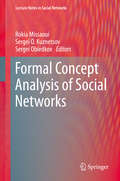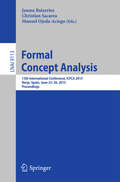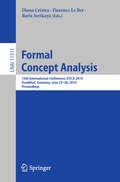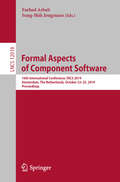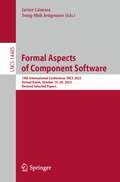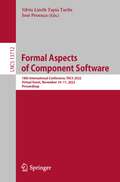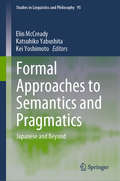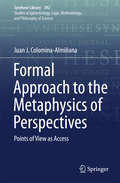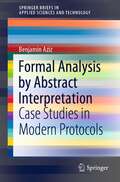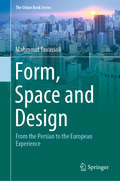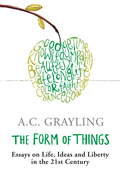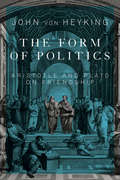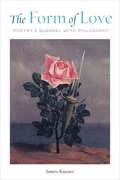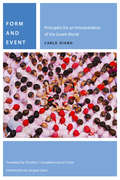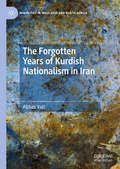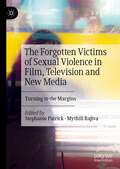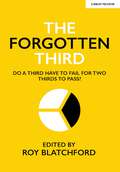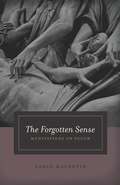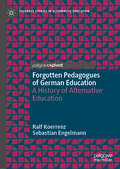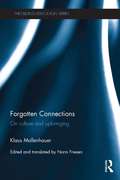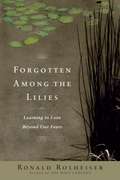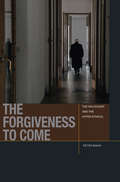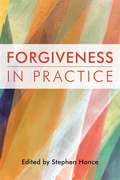- Table View
- List View
Formal Concept Analysis of Social Networks (Lecture Notes in Social Networks)
by Sergei Obiedkov Sergei O. Kuznetsov Rokia MissaouiThe book studies the existing and potential connections between Social Network Analysis (SNA) and Formal Concept Analysis (FCA) by showing how standard SNA techniques, usually based on graph theory, can be supplemented by FCA methods, which rely on lattice theory. The book presents contributions to the following areas: acquisition of terminological knowledge from social networks, knowledge communities, individuality computation, other types of FCA-based analysis of bipartite graphs (two-mode networks), multimodal clustering, community detection and description in one-mode and multi-mode networks, adaptation of the dual-projection approach to weighted bipartite graphs, extensions to the Kleinberg's HITS algorithm as well as attributed graph analysis.
Formal Concept Analysis
by Jaume Baixeries Christian Sacarea Manuel Ojeda-AciegoThis book constitutes the refereed proceedings of the 13th International Conference on Formal Concept Analysis, ICFCA 2015, held in Neja, Spain, in June 2015. The 16 revised full papers presented were carefully reviewed and selected from 38 submissions. The topics in this volume cover theoretical aspects of FCA; methods and applications of FCA to different fields and enhanced FCA that show new trends in FCA, for instance, pattern structures of fuzzy FCA.
Formal Concept Analysis: 15th International Conference, ICFCA 2019, Frankfurt, Germany, June 25–28, 2019, Proceedings (Lecture Notes in Computer Science #11511)
by Diana Cristea Florence Le Ber Baris SertkayaThis book constitutes the proceedings of the 15th International Conference on Formal Concept Analysis, ICFCA 2019, held in Frankfurt am Main, Germany, in June 2019.The 15 full papers and 5 short papers presented in this volume were carefully reviewed and selected from 36 submissions. The book also contains four invited contributions in full paper length. The field of Formal Concept Analysis (FCA) originated in the 1980s in Darmstadt as a subfield of mathematical order theory, with prior developments in other research groups. Its original motivation was to consider complete lattices as lattices of concepts, drawing motivation from philosophy and mathematics alike. FCA has since then developed into a wide research area with applications much beyond its original motivation, for example in logic, data mining, learning, and psychology.
Formal Aspects of Component Software: 16th International Conference, FACS 2019, Amsterdam, The Netherlands, October 23–25, 2019, Proceedings (Lecture Notes in Computer Science #12018)
by Farhad Arbab Sung-Shik JongmansThis book constitutes the thoroughly revised selected papers from the 16th International Conference on Formal Aspects of Component Software, FACS 2019, held in Amsterdam, The Netherlands, in October 2019.The 9 full papers presented together with 9 full papers and 3 short papers as well as 2 other papers were carefully reviewed and selected from 27 submissions. FACS 2019 is concerned with how formal methods can be used to make component-based and service-oriented software development succeed. Formal methods have provided a foundation for component-based software by successfully addressing challenging issues such as mathematical models for components, composition and adaptation, or rigorous approaches to verification, deployment, testing, and certification.
Formal Aspects of Component Software: 19th International Conference, FACS 2023, Virtual Event, October 19-20, 2023, Revised Selected Papers (Lecture Notes in Computer Science #14485)
by Javier Cámara Sung-Shik JongmansThis book constitutes the refereed proceedings of the 19th International Conference on Formal Aspects of Component Software, FACS 2023, which took place virtually during October 19-20, 2023.The 11 full papers included in this book were carefully reviewed and selected from 23 submissions. They were organized in topical sections as follows: cloud computing, cyber-physical and critical systems, and the Internet of Things.
Formal Aspects of Component Software: 18th International Conference, FACS 2022, Virtual Event, November 10–11, 2022, Proceedings (Lecture Notes in Computer Science #13712)
by Silvia Lizeth Tapia Tarifa José ProençaThis book constitutes the thoroughly revised selected papers from the 18th International Symposium, FACS 2022, which was held online in November 2022.The 12 full papers and 1 short paper were carefully reviewed and selected from 25 submissions. FACS 2021 is focusing on the areas of component software and formal methods in order to promote a deeper understanding of how formal methods can or should be used to make component-based software development succeed.
Formal Approaches to Semantics and Pragmatics: Japanese and Beyond (Studies in Linguistics and Philosophy #95)
by Elin McCready Katsuhiko Yabushita Kei YoshimotoThis volume presents an exploration of a wide variety of new formal methods from computer science, biology and economics that have been applied to problems in semantics and pragmatics in recent years. Many of the contributions included focus on data from East Asian languages, particularly Japanese and Korean. The collection reflects on a range of new empirical issues that have arisen, including issues related to preference, evidentiality and attention. Separated into several sections, the book presents discussions on: information structure, speech acts and decisions, philosophical themes in semantics and new formal approaches to semantic and pragmatic theory. Its overarching theme is the relation between different kinds of content, from a variety of perspectives. The discussions presented are both theoretically innovative and empirically motivated.
Formal Approach to the Metaphysics of Perspectives: Points of View as Access (Synthese Library #392)
by Juan J. Colomina-AlmiñanaThis book offers a metaphysical development of the notion of perspective. By explaining the functional nature of point of view, and by providing a concrete definition of point of view as a window through which to see the world, it offers a scientific realist theory that explains that points of view are real structures that ground properties and objects as well as perspectives. The notion of point of view has been of key importance in the history of philosophy, and different philosophical schools have used this notion to conduct analyses from the external reality to the inner phenomenal status, or even to construct an entire philosophical system. However, there has been a lack of systematic analysis of what a point of view is and what its structure is; this book fills the gap in the literature and makes the transition between semantics and epistemology, and the philosophy of science.
Formal Analysis by Abstract Interpretation: Case Studies in Modern Protocols (SpringerBriefs in Applied Sciences and Technology)
by Benjamin AzizThe book provides a gentle introduction and definition of the denotational-based abstract interpretation method. The book demonstrates how the above method of formal analysis can be used, not only to address the security of systems, but other more general and interesting properties related to the testing, mutating and semantic ambiguity resolution of protocols. The book presents three case studies, all related to current complex protocols and standards used in industry, particularly in the context of IoT and Industry 4.0.
Form, Space and Design: From the Persian to the European Experience (The Urban Book Series)
by Mahmoud TavassoliThis book studies the principles of urban spatial organization of historic cities. It can be considered a guide to design, presenting qualitative criteria to satisfy practical needs. The subject is explored through interconnected chapters, each addressing an important aspect of form-space and design values, knowledge and our present problems. In this book the interpretation is artistic and socio-cultural. Discussion is not concentrated on singular urban space but on interrelated spaces and elements across the city, and complexes. Considering the comparative aspects of study, the reader will notice that despite cultural differences, there is a common understanding in artistic creativity and sensibility in the presented examples.
The Form of Things: Essays on Life, Ideas and Liberty
by A. C. GraylingThe bestseller from our pre-eminent philosopher, A.C. Grayling'Grief and loneliness, depression, despair and failure - those things are the common human lot at least at times in all our lives'. Yet it is philosophy which, while not providing an answer to these problems, can enable us to prepare for them, and create strategies with which to deal with them. It is only through reflecting upon the world around us, reading, thinking, questioning, enjoying, that we can inculcate understanding, tolerance and importantly the courage to live our lives. It is our responsibility to live such 'considered lives' and to realise that we are authors of a narrative that can be shaped and controlled.This is the fifth in a series of essay miscellanies from our foremost philosopher A.C. Grayling, reflecting upon the form of our world and its multiplicity. The essays are grouped by theme into reflections upon life and the standards we live by, including vivid polemics and perceptive pieces on significant thinkers, contemporary rights and liberties issues. This book brilliantly articulates the philosophical debate and reflection that is needed to prepare us for life in the twenty-first century.
The Form of Things: Essays on Life, Ideas and Liberty
by Prof A.C. GraylingThe bestseller from our pre-eminent philosopher, A.C. Grayling'Grief and loneliness, depression, despair and failure - those things are the common human lot at least at times in all our lives'. Yet it is philosophy which, while not providing an answer to these problems, can enable us to prepare for them, and create strategies with which to deal with them. It is only through reflecting upon the world around us, reading, thinking, questioning, enjoying, that we can inculcate understanding, tolerance and importantly the courage to live our lives. It is our responsibility to live such 'considered lives' and to realise that we are authors of a narrative that can be shaped and controlled.This is the fifth in a series of essay miscellanies from our foremost philosopher A.C. Grayling, reflecting upon the form of our world and its multiplicity. The essays are grouped by theme into reflections upon life and the standards we live by, including vivid polemics and perceptive pieces on significant thinkers, contemporary rights and liberties issues. This book brilliantly articulates the philosophical debate and reflection that is needed to prepare us for life in the twenty-first century.
Form of Politics: Aristotle and Plato on Friendship
by John Von HeykingFor statesmen, friendship is the lingua franca of politics. Considering the connections between personal and political friendship, John von Heyking's The Form of Politics interprets the texts of Plato and Aristotle and emphasizes the role that friendship has in enduring philosophical and contemporary political contexts. Beginning with a discussion on virtue-friendship, described by Aristotle and Plato as an agreement on what qualifies as the pursuit of good, The Form of Politics demonstrates that virtue and political friendship form a paradoxical relationship in which political friendships need to be nourished by virtue-friendships that transcend the moral and intellectual horizons of the political society. Von Heyking then examines Aristotle's ethical and political writings - which are set within the boundaries of political life - and Plato's dialogues on friendship in Lysis and the Laws, which characterize political friendship as festivity. Ultimately, arguing that friendship is the high point of a virtuous political life, von Heyking presents a fresh interpretation of Aristotle and Plato's political thought, and a new take on the most essential goals in politics. Inviting reassessment of the relationship between friendship and politics by returning to the origins of Western philosophy, The Form of Politics is a lucid work on the foundations of political cooperation.
Form of Politics: Aristotle and Plato on Friendship (McGill-Queen's Studies in the History of Ideas #66)
by John von HeykingFor statesmen, friendship is the lingua franca of politics. Considering the connections between personal and political friendship, John von Heyking’s The Form of Politics interprets the texts of Plato and Aristotle and emphasizes the role that friendship has in enduring philosophical and contemporary political contexts. Beginning with a discussion on virtue-friendship, described by Aristotle and Plato as an agreement on what qualifies as the pursuit of good, The Form of Politics demonstrates that virtue and political friendship form a paradoxical relationship in which political friendships need to be nourished by virtue-friendships that transcend the moral and intellectual horizons of the political society. Von Heyking then examines Aristotle’s ethical and political writings – which are set within the boundaries of political life – and Plato’s dialogues on friendship in Lysis and the Laws, which characterize political friendship as festivity. Ultimately, arguing that friendship is the high point of a virtuous political life, von Heyking presents a fresh interpretation of Aristotle and Plato’s political thought, and a new take on the most essential goals in politics. Inviting reassessment of the relationship between friendship and politics by returning to the origins of Western philosophy, The Form of Politics is a lucid work on the foundations of political cooperation.
The Form of Love: Poetry’s Quarrel with Philosophy
by James KuznerCan poetry articulate something about love that philosophy cannot? The Form of Love argues that it can. In close readings of seven “metaphysical” poems, the book shows how poets of the early modern period and beyond use poetic form to turn philosophy to other ends, in order not to represent the truth about love but to create a virtual experience of love, in all its guises. The Form of Love shows how verse creates love that can’t exist without poetry’s specific affordances, and how poems can, in their impossibility, prompt love’s radical re-imagining. Like the philosophies on which they draw, metaphysical poems imagine love as an intense form of non-sovereignty, of giving up control. They even imagine love as a liberating bondage—to a friend, a beloved, a saint, a God, or a garden. Yet these poems create strange, striking versions of such love, made in, rather than through, the devices, structures, and forces where love appears.Tracing how poems think, Kuzner argues, requires an intimate form of reading: close—even too close—attention to and thinking with the text. Showing how poetry thinks of love otherwise than other fields, the book reveals how poetry and philosophy can nevertheless enter into a relation that is itself like love.
Form and Event: Principles for an Interpretation of the Greek World (Commonalities)
by Carlo DianoCarlo Diano’s Form and Event has long been known in Europe as a major work not only for classical studies but even more for contemporary philosophy. Already available in Italian, French, Spanish, and Greek, it appears here in English for the first time, with a substantial Introduction by Jacques Lezra that situates the book in the genealogy of modern political philosophy.Form and Event reads the two classical categories of its title phenomenologically across Aristotle, the Stoics, and especially Homer. By aligning Achilles with form and Odysseus with event, Diano links event to embodied and situated subjective experience that simultaneously finds its expression in a form that objectifies that experience. Form and event do not exist other than as abstractions for Diano but they do come together in an intermingling that Diano refers to as the “eventic form.” On Diano’s reading, eventic forms interweave subjectively situated and embodied experiences, observable in all domains of human and nonhuman life.A stunning interpretation of Greek antiquity that continues to resonate since its publication in 1952, Form and Event anticipates the work of such French and Italian post-war thinkers as Gilles Deleuze, Alain Badiou, Roberto Esposito, and Giorgio Agamben.
The Forgotten Years of Kurdish Nationalism in Iran (Minorities in West Asia and North Africa)
by Abbas ValiThis book investigates the forgotten years of Kurdish nationalism in Iran, from the fall of the Kurdish republic to the advent of the Iranian revolution. An original and path-breaking investigation of the period, it sheds light not only on the historical specificity of the phenomenon of nationalism in exile, but also on the political processes and practices defining the development of Kurdish nationalism in the post-revolutionary era. Although nationalist landmarks such as the Kurdish republic in 1946 and the resurgence of the movement in the revolutionary conjuncture of 1978-79 have attracted the attention of historians and social scientists in recent years, little is known about the three decades of Kurdish nationalism in exile between these two events. This analysis draws on contemporary poststructuralist theory to question the concept of the minority in democratic and constitutional theory, arguing that it is an effect of the discursive linkage between sovereign power and the dominant ethnic-linguistic identity in the nation-state. This text will appeal to a wide academic audience ranging from the fields of Kurdish, Iranian and Middle East Studies to ethnicity, nationalism, government, and political science.
The Forgotten Victims of Sexual Violence in Film, Television and New Media: Turning to the Margins
by Stephanie Patrick Mythili RajivaThis edited collection provides an intersectional and transnational exploration of representations of sexual violence and rape within films, television shows, and digital media in the contemporary context of the #MeToo and #TimesUp movements. Drawing upon sociology, gender studies, cultural studies, media studies, and Black feminist studies, chapters focus on women and texts at the margins of mainstream culture’s depictions of sexual violence. The editors and contributors examine the dominant narrative of the thin, cisgender, heterosexual white female victim, and the ways in which social and cultural conversations around race and gender impact and are impacted by depictions of sexual violence in media. This book will be of interest to scholars and students in sociology, gender studies, and media studies, particularly those interested in the intersectionality of race and gender.Chapter 1 is available open access under a Creative Commons Attribution 4.0 International License via link.springer.com.
The Forgotten Third: Do One Third Have To Fail For Two Thirds To Succeed?
by Roy Blatchford'The Forgotten Third' is a provocative collection of essays which poses the fundamental question: 'Do a third of school students have to fail so that two-thirds can pass?'Roy Blatchford has brought together a group of leading thinkers and influencers in UK education to address this question - and pose some answers.Featuring contributions from: Caroline Barlow, Geoff Barton, Rebecca Boomer-Clark, Peter Collins, Tim Coulson, Kiran Gill, Miranda Green, Peter Hyman, David Laws, Rachel Macfarlane, Rupert Moreton, Harmer Parr, Marc Rowland, Catherine Sezen, Richard Sheriff, Nic Taylor-Mullins and Iain Veitch.'The Forgotten Third' challenges orthodoxies to shape a 'levelled up' education system.
The Forgotten Sense: Meditations on Touch
by Pablo MauretteOf all the senses, touch is the most ineffable—and the most neglected in Western culture, all but ignored by philosophers and artists over millennia. Yet it is also the sense that links us most intimately to the world around us, from our mother’s caress when we’re born to the gentle lowering of our eyelids after death. The Forgotten Sense gives touch its due, addressing it in multifarious ways through a series of six essays. Literary in feel, ambitious in conception, admirable in their range of reference and insight, these meditations address questions fundamental to the understanding of touch: What do we mean when we say that an artwork touches us? How does language affect our understanding of touch? Is the skin the deepest part of the human body? Can we philosophize about a kiss? To aid him in answering these questions, Pablo Maurette recruits an impressive roster of cultural figures from throughout history: Homer, Lucretius, Chrétien de Troyes, Melville, Sir Thomas Browne, Knausgaard, Michel Henry and many others help him unfurl the underestimated importance of the sense of touch and tactile experience. The resulting book is essay writing at its best—exploratory, surprising, dazzling, a reading experience like no other. You will come away from it with a new appreciation of touch, and a new way of understanding our interactions with the world around us.
Forgotten Pedagogues of German Education: A History of Alternative Education (Palgrave Studies in Alternative Education)
by Ralf Koerrenz Sebastian EngelmannThis book introduces six pedagogues from the German context to an English-speaking audience, and demonstrates their significant contribution to the field of alternative education. First and foremost, the authors emphasise the importance of understanding the history of education, to realise that in fact what we understand as ‘normal’ today is by no means the only course history could have taken. The quest for alternative ways of schooling goes back to the late eighteenth century, where educational thinkers advocated various approaches in the face of rapid societal change. The chosen six thinkers are not well known in the English-speaking scientific community, and some are even infrequently cited in the German context. In offering an historic and systematic introduction to concepts that can frame Alternative Education in different ways, this book allows the reader to critically reevaluate present forms of education by using the past as a mirror.
Forgotten Connections: On culture and upbringing (Theorizing Education)
by Klaus MollenhauerKlaus Mollenhauer’s Forgotten Connections: On Culture and Upbringing is internationally regarded as one of the most important German contributions to educational and curriculum theory in the 20th century. Appearing here in English for the first time, the book draws on Mollenhauer’s concern for social justice and his profound awareness of the pedagogical tension between the inheritance of the past and the promise of the future. The book focuses on the idea of Bildung, in which philosophy and education come together to see upbringing and maturation as being much more about holistic experience than skill development. This translation includes a detailed introduction from Norm Friesen, the book’s translator and editor. This introduction contextualizes the original publication and discusses its application to education today. Although Mollenhauer’s work focused on content and culture, particularly from a German perspective, this book draws on philosophy and sociology to offer internationally relevant responses to the challenge of communicating cultural values and understandings to new generations. Forgotten Connections will be of value to students, researchers and practitioners working in the fields of education and culture, curriculum studies, and in educational and social foundations.
Forgotten Among the Lilies: Learning to Love Beyond Our Fears
by Ronald RolheiserThe author of The Holy Longing explores the debilitating obsessions that often dominate our lives and offers down-to-earth guidance for learning to leave our fears, anxieties, and guilt "forgotten among the lilies." "Rarely do we taste the food we eat or the coffee we drink. Instead we go through our days too preoccupied, too compulsive, and too dissatisfied to really be able to be present for and celebrate our own lives," Ronald Rolheiser writes in the introduction to this powerful collection of essays...
The Forgiveness to Come: The Holocaust and the Hyper-Ethical
by Peter BankiThis book is concerned with the aporias, or impasses, of forgiveness, especially in relation to the legacy of the crimes against humanity perpetrated by the Nazis and their collaborators during World War II. Banki argues that, while forgiveness of the Holocaust is and will remain impossible, we cannot rest upon that impossibility. Rather, the impossibility of forgiveness must be thought in another way. In an epoch of “worldwidization,” we may not be able simply to escape the violence of scenes and rhetoric that repeatedly portray apology, reconciliation, and forgiveness as accomplishable acts. Accompanied by Jacques Derrida’s thought of forgiveness of the unforgivable, and its elaboration in relation to crimes against humanity, the book undertakes close readings of literary, philosophical, and cinematic texts by Simon Wiesenthal, Jean Améry, Vladimir Jankélévitch, Robert Antelme and Eva Mozes Kor. These texts contend with the idea that the crimes of the Nazis are inexpiable, that they lie beyond any possible atonement or repair. Banki argues that the juridical concept of crimes against humanity calls for a thought of forgiveness—one that would not imply closure of the infinite wounds of the past. How could such a forgiveness be thought or dreamed? Banki shows that if today we cannot simply escape the “worldwidization” of forgiveness, then it is necessary to rethink what forgiveness is, the conditions under which it supposedly takes place, and especially its relation to justice.
Forgiveness in Practice
by Stephen Hance Howard Cooper Anthony Bash Reza Shah-Kazemi Vajragupta Gwen Adshead Jesse Butler Meadows Stephen Cherry Deborah Bowman Marian Liebmann Robin Shohet Christiane Sanderson Honor Rhodes Amanda Boorman Steve Nolan Richard Carter Graham Spencer Lord Alderdice Marina Cantacuzino Chris Cook Wendy Dossett Liz GullifordForgiveness has often viewed as a religious obligation but is increasingly being advocated as a means of healing, release and promoting wellbeing. Forgiveness is variously viewed as a duty, virtue or cure, but when it comes to practising forgiveness in real life we find it is always caught up in the complexity of the situation. This book shines a light on how we tend to think about forgiveness in practice, including examples from social work, family therapy, chaplaincy and criminal justice.The book contains many different perspectives on how we think about forgiveness, including overviews of four major religions and reflections from those working in the healing professions. Without advocating a particular approach this book raises important questions around self-forgiveness and forgiving institutions and encourages the reader to think again about forgiveness and how it impacts, challenges and transforms relationships.
